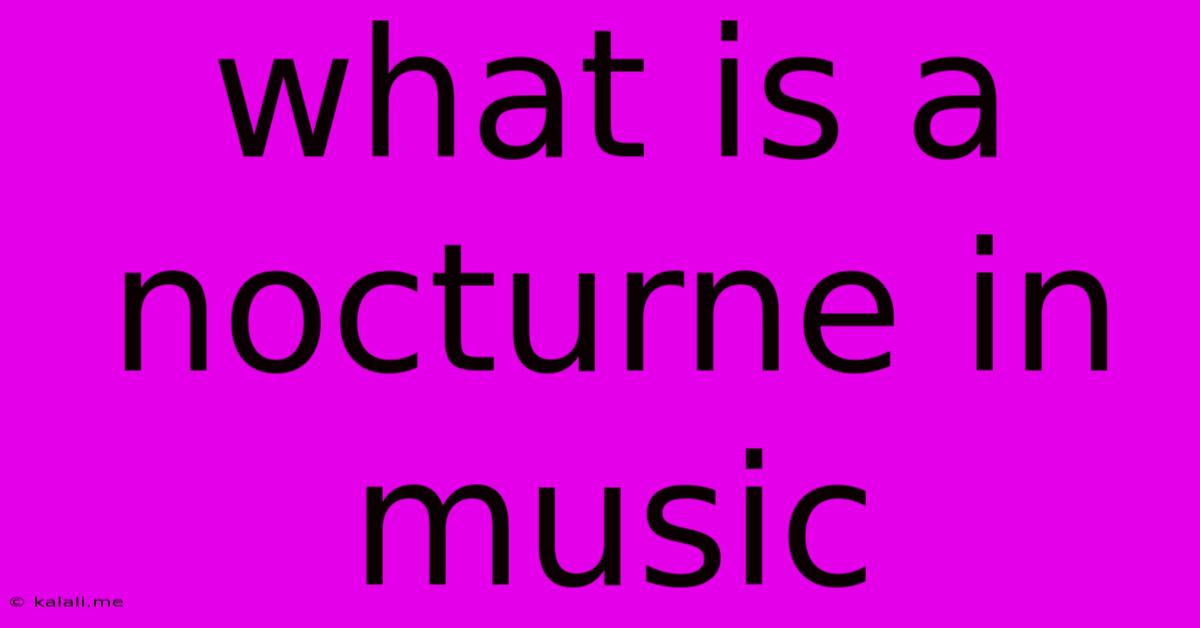What Is A Nocturne In Music
Kalali
Jun 01, 2025 · 3 min read

Table of Contents
What is a Nocturne in Music? A Deep Dive into Night Music
The term "nocturne" conjures images of moonlit nights, quiet introspection, and perhaps a gentle breeze rustling through leaves. And that's precisely what a nocturne is in music: a musical composition evoking the serenity and mystery of night. But it's more than just a pretty melody; it's a specific genre with a rich history and distinct characteristics. This article delves into the definition, history, and key features of the nocturne, exploring its enduring appeal and influence on musical landscapes.
Defining the Nocturne: More Than Just Night Music
While the name directly translates to "night piece," a nocturne isn't simply any piece of music written at night or about night. It's a genre with specific musical traits that contribute to its characteristic mood. These include:
- Lyrical Melodies: Nocturnes are predominantly characterized by their beautiful, flowing, and often melancholic melodies. These melodies are typically singable and easy to remember, fostering an intimate and emotional connection with the listener.
- Slow Tempo: The tempo is generally slow and relaxed, contributing to the overall sense of calm and tranquility. The pace allows for a detailed exploration of the melody and harmony.
- Harmonically Rich: While often melancholic, the harmonies are usually quite rich and complex, adding depth and emotional resonance to the piece. Unexpected harmonic shifts can enhance the feeling of mystery and intrigue.
- Subdued Dynamics: Nocturnes frequently utilize a range of dynamics, often starting softly and building gradually to moments of greater intensity before subsiding back to quietude. This dynamic variation helps to build tension and release, mimicking the ebb and flow of nighttime experiences.
- Often for Solo Piano: While nocturnes can be written for other instruments or ensembles, they are most strongly associated with the solo piano. The piano's versatility allows for a wide range of expressive possibilities, perfectly suited to the genre's intimate and reflective nature.
A Historical Journey Through Nocturnes
The nocturne as a distinct musical genre solidified in the early 19th century, largely thanks to the Polish composer Fryderyk Chopin. While other composers explored similar nocturnal themes before him, Chopin’s nocturnes set a new standard, defining the characteristics we associate with the form today. His nocturnes are renowned for their exquisite melodies, sophisticated harmonies, and profound emotional depth.
Before Chopin, composers like John Field are considered pioneers of the nocturne form. Field's nocturnes, while less complex harmonically than Chopin's, helped establish the genre’s basic characteristics, including its lyrical melodies and tranquil atmosphere. He significantly influenced Chopin, and his contributions should not be overlooked.
The Enduring Legacy of the Nocturne
The nocturne, particularly Chopin's masterpieces, continues to hold a special place in the hearts of musicians and audiences alike. Its capacity to evoke a wide range of emotions, from gentle melancholy to profound longing, ensures its continued relevance. The genre’s influence can be seen in various other musical styles, showcasing its enduring impact on the broader musical landscape. From classical to contemporary music, the elements of the nocturne – the lyrical melodies, the slow tempo, the rich harmonies – continue to inspire composers.
Beyond the Piano: Exploring Nocturnes in Different Contexts
While the piano is the instrument most strongly associated with the nocturne, the genre has also been explored by composers for other instruments and ensembles. The essential characteristics – the evocative atmosphere, lyrical melodies, and slow tempo – remain consistent, even when adapted to different sonic palettes. Exploring these variations reveals the versatility and enduring appeal of the nocturnal mood in music.
In conclusion, the nocturne is far more than just a piece of music about the night; it's a distinct genre with its own unique musical language. Its ability to evoke a range of emotions and its enduring popularity speak to its power and lasting appeal. The next time you listen to a nocturne, take a moment to appreciate the intricate interplay of melody, harmony, and rhythm that creates this magical and evocative musical experience.
Latest Posts
Latest Posts
-
How To Book Flights From Another Country
Jun 03, 2025
-
Hot Water Only Lasts 5 Minutes
Jun 03, 2025
-
Can I Use Folks For Two Individuals
Jun 03, 2025
-
What Does For The Good Of The Order Mean
Jun 03, 2025
-
Windows 98 Usb Flash Drive Driver
Jun 03, 2025
Related Post
Thank you for visiting our website which covers about What Is A Nocturne In Music . We hope the information provided has been useful to you. Feel free to contact us if you have any questions or need further assistance. See you next time and don't miss to bookmark.